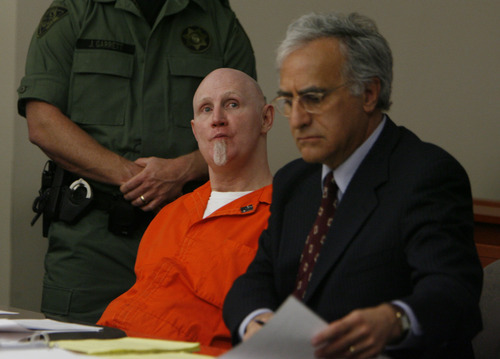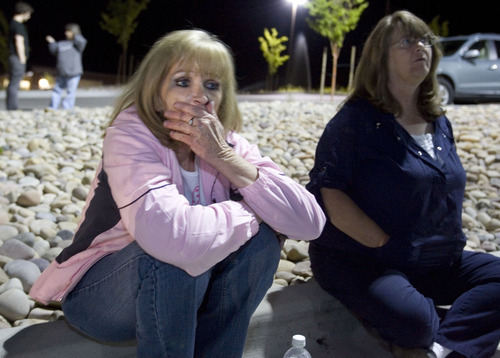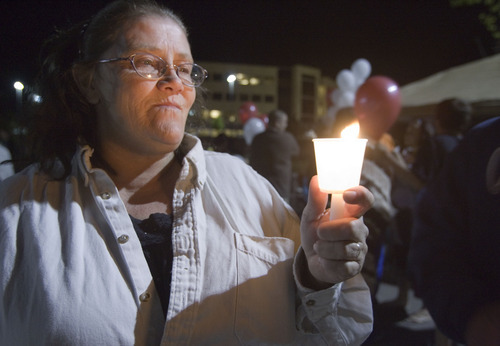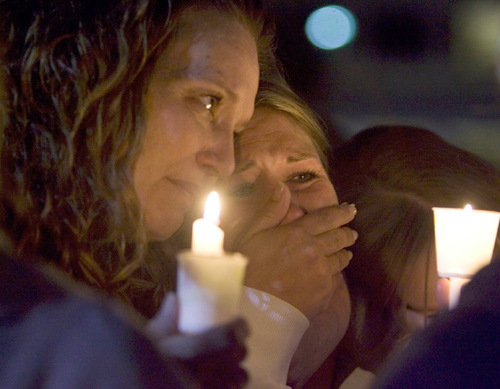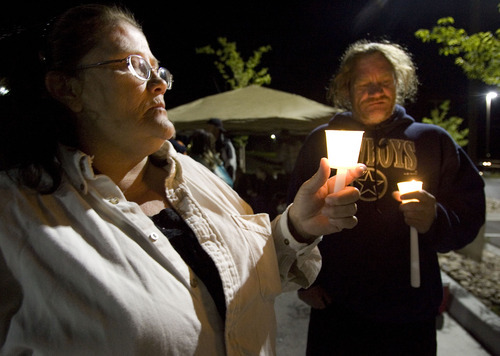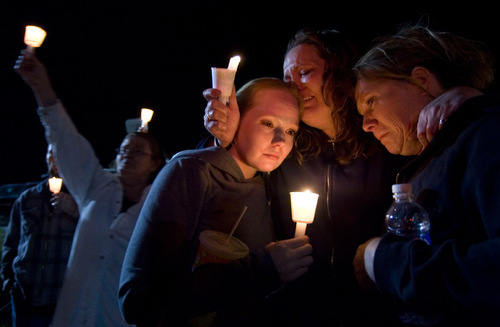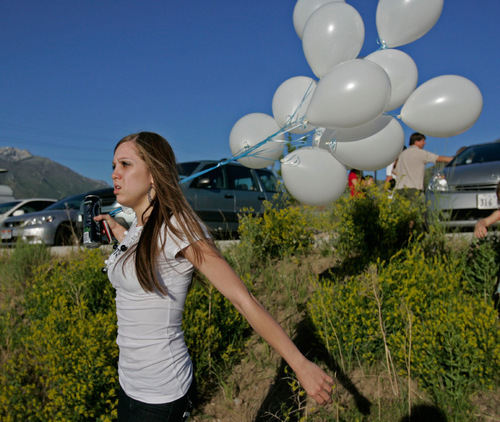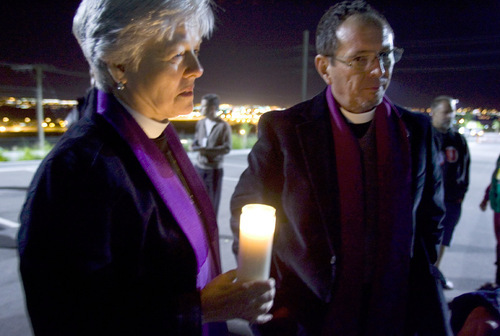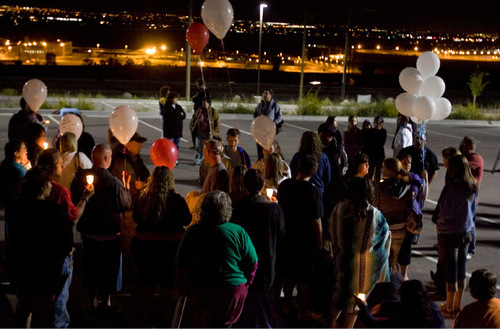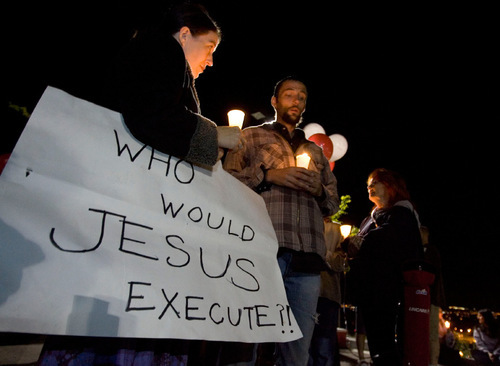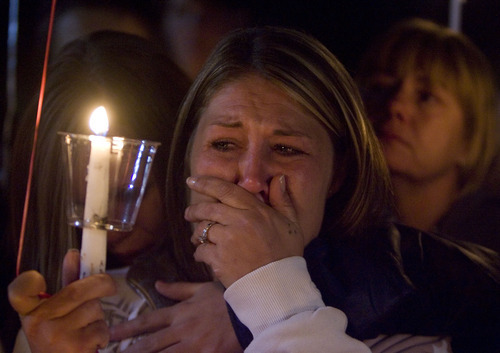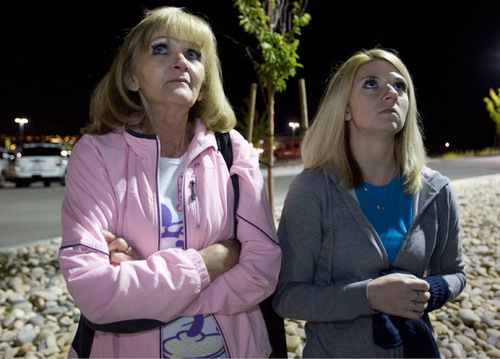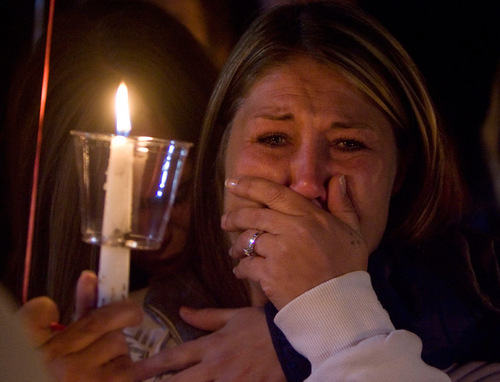This is an archived article that was published on sltrib.com in 2011, and information in the article may be outdated. It is provided only for personal research purposes and may not be reprinted.
This story originally ran on June 18, 2010.
Ronnie Lee Gardner's quarter-century on death row ended at 12:20 a.m. today when a firing squad executed one of Utah's most notorious killers. His death signaled the end of a gut-wrenching saga for the families of the Utah men Gardner murdered or wounded and those who had hoped to spare the killer's life.
Barb Webb, daughter of Gardner victim Nick Kirk, sobbed when news of the execution came.
"I'm so relieved it's all over," she said, hugging her daughter, Mandi Hull. "I just hope my sister, who just passed away, and my father and all of the other victims are waiting for his sorry ass. I hope they get to go down after him.
"April 2, 1985, isn't going to keep coming up over and over again."
Just after midnight, Gardner's family members leaned against each other in a tight cluster and sobbed. They played Lynyrd's Skynyrd's "Free Bird," singing along.
"I'm just glad it's over. I'm glad he's free," said Randy Gardner after his brother's death.
Other Gardner relatives whooped and cheered as they released 24 balloons decorated with messages.
"I love you, Ron!" some of them screamed, falling into each other's arms. Gardner's daughter, Brandie Gardner, put her hands to her face and sobbed.
For the nation, the 49-year-old Salt Lake City man's death by four bullets marked what could be the last execution of its kind in the country.
Utah is the only state still using a firing squad, and only four men on death row could still choose it — the state switched to lethal injection in 2004.
Gardner's story went global when he told a judge the method he preferred to become one of the 50-odd people executed in the United States each year: "I would like the firing squad, please."
Some hope the attention will highlight problems meting out capital punishment in Utah. Both death penalty opponents and believers decry the nearly 25 years Gardner spent between his conviction and execution for the April 1985 murder of Michael Burdell.
Earlier this month, attorneys for the son of a Provo woman killed in her home during a 1985 robbery by death row inmate Douglas Stewart Carter asked a federal judge to speed up appeals in that 25-year-old case.
"My dad passed away last year. He didn't have any closure," said Gary Olesen, son of victim Eva Olesen. "I'm hoping Gardner's execution will help. But I'm not sure it will."
Jani S. Tillery, from the Maryland Crimes Victims' Resource Center, said her client is only asking the court to "move forward."
Utah Attorney General Mark Shurtleff, who has pushed to streamline death row appeals, said the run-up to today's execution may have generated legislative momentum to remake state law.
"I'm hearing from a lot of people, 25 years is just too long," said Shurtleff. "It's ridiculous."
Ralph Dellapiana, an attorney affiliated with Utahns for Alternatives to the Death Penalty, said he hopes Gardner's death will spark discussion "that this arbitrary process be changed to something else."
The last two executions in Utah have been of killers who halted their own death row appeals. John Albert Taylor was executed in 1996 after eight years on death row, while Joseph Mitchell Parsons spent 11 years on death row before his 1999 execution.
Unlike them, Gardner has fought to the bitter end.
Gardner's appellate attorneys have argued unsuccessfully over the years that if his jurors had known about the mitigating factors surrounding his troubled childhood — poverty, drugs, violence and sex abuse — they would have sentenced him to life in prison.
As part of Gardner's bid for commutation before the Utah Board of Pardons and Parole, three of those jurors signed affidavits saying they would have sentenced Gardner to life without parole if that possibility had been available. A fourth said he would have seriously considered it. Life without parole was not possible until 1992 in Utah.
Gardner himself told the parole board last week he was a changed man from the person who shot and killed Melvyn Otterstrom at The Cheers Tavern on Oct. 24, 1984.
Just before an April 2, 1985, court hearing in the Otterstrom case, Gardner killed attorney Michael Burdell and seriously wounded bailiff Nick Kirk in a failed courthouse escape.
Gardner said over the past decade he had become cognizant of the pain he had caused his victims and their families. He told the parole board he had developed a new awareness of why he had been so violent and impulsive.
"I can't even apologize to the victims, and it makes me sad," said a crying Gardner. "People at that courthouse that didn't even get hurt, I'm sure it traumatized them."
He told the parole board he wanted to spend the rest of his life counseling young inmates and helping abused children with an organic farm program. Gardner also argued his execution would bring the families of his victims little comfort.
"I know killing me is going to hurt them just as bad," he said. "I've been on the other side of that gun."
Yet Gardner was unable to shed his reputation.
Over the past 25 years Gardner has captured headlines numerous times for attacks on other inmates and misbehavior including a standoff at a prison visiting room where he broke down a glass partition, barricaded the door and had sex with his half-brother's wife as officers looked on helplessly.
Members of the victims' families argued both for and against Gardner's death. All said they wanted to end a long nightmare.
"This story must be allowed to slip into history," said Jason Otterstrom during the commutation hearing. "Our families need peace."
The parole board unanimously voted against Gardner. A flurry of last-minute appeals to the governor, U.S. Supreme Court, and 10th U.S. Circuit Court of Appeals also failed.
A bishop with The Church of Jesus Christ of Latter-day Saints served as Gardner's spiritual adviser at the end of his life, his attorneys said.
Gardner became the 1,213th person nationally and the seventh in Utah to be executed since the U.S. Supreme Court reinstated the death penalty in 1976.
The justices halted executions four years earlier, finding the ultimate punishment was not being applied equally.
– Tribune reporters Nate Carlisle, Pamela Manson, Sheena McFarland, and Matthew D. LaPlante contributed to this report.


